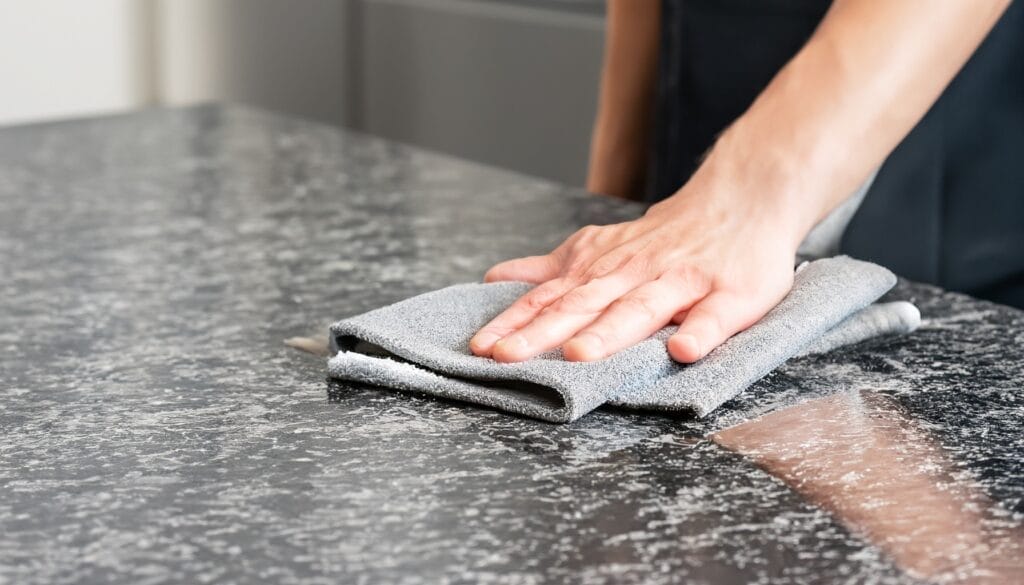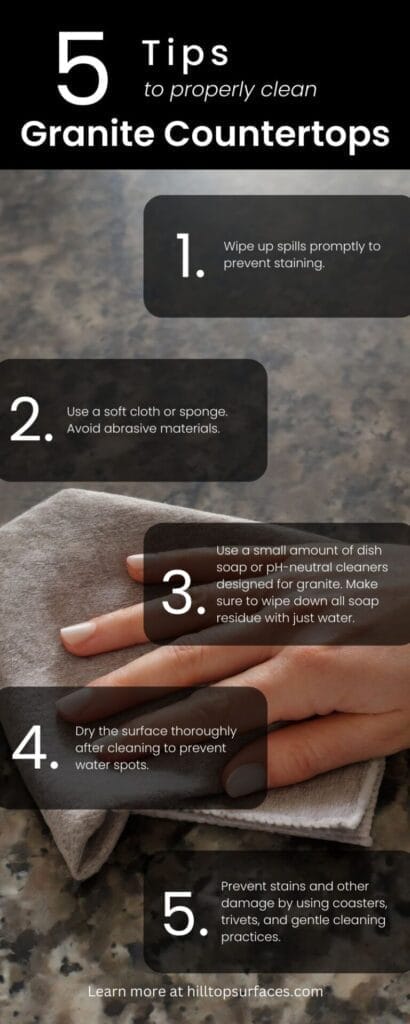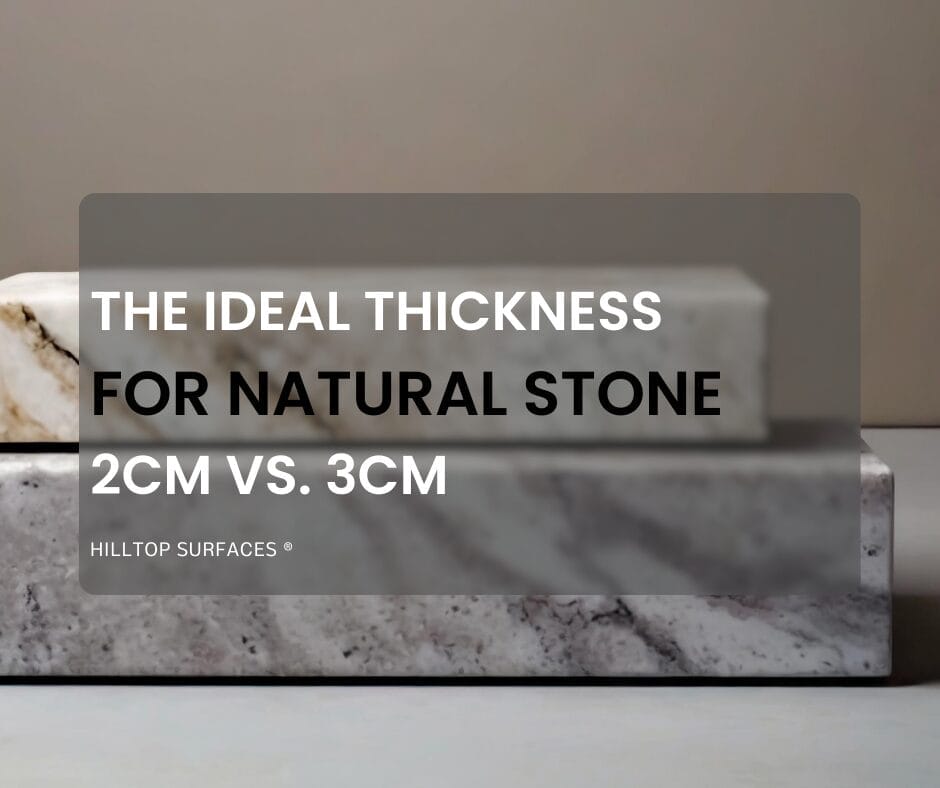Granite Countertops, with their natural beauty and durability, add a touch of sophistication to any kitchen. To maintain their timeless appeal, it’s essential to understand the proper cleaning methods. In this guide, we’ll list the dos and don’ts of Granite Countertop Care, answer common questions, and provide you with the knowledge to keep your granite surfaces gleaming.
The Best Way to Clean Granite Countertops
Ensuring your Granite Countertops stay pristine begins with selecting the best cleaning solutions. Always test any cleaner or solution on an inconspicuous area of your countertop to make sure it won’t cause any damage.
Mild Dish Soap and Warm Water:
Use a mixture of mild dish soap and warm water for daily cleaning. This gentle solution effectively removes dirt and spills without damaging the granite surface. Make sure to wipe down all soap residue with just water.
Safe Cleaners for Granite:
Opt for granite-specific cleaners available in the market. These are formulated to clean and protect without causing harm to the granite’s seal. Make sure to wipe down all cleaner residue with just water.
Natural Solutions:
Create a DIY solution using a mix of water and isopropyl alcohol or a solution of equal parts water and white vinegar. These natural alternatives are effective and safe for granite. Make sure to wipe down all solution residue with just water.
Granite Cleaning Dos and Don’ts
Dos:
– Wipe up spills promptly to prevent staining.
– Use coasters under glasses and dishes to avoid potential scratches.
– Dust or sweep the countertop regularly to remove debris and prevent scratches.
– Dry the surface thoroughly after cleaning to prevent water spots.

How to Clean Granite Countertops
Don’ts:
– Use abrasive cleaners or scouring pads that can scratch the surface.
– Place hot pans directly on the granite; use trivets or hot pads.
– Allow acidic substances like vinegar or lemon juice to sit on the surface.
– Use generic or all-purpose cleaners that may contain harsh chemicals.
Common Mistakes to Avoid in Granite Countertop Care
Granite Countertops, while resilient, require careful attention to detail in their maintenance. Understanding common mistakes can help you steer clear of potential issues that may compromise the longevity and beauty of your granite surfaces.
- Using Harsh Cleaners:
- Using harsh or abrasive cleaners on granite can strip away its protective seal, leaving it vulnerable to stains and scratches.
- Stick to gentle, pH-neutral cleaners designed for granite to ensure effective cleaning without compromising the stone’s integrity.
- Neglecting Regular Sealing:
- Overlooking the importance of regular sealing leaves granite susceptible to stains and spills, diminishing its protective layer.
- Adhere to the recommended sealing schedule based on the Type of Granite and usage. This simple step enhances the stone’s resistance to potential damage.
- Ignoring Spills and Stains:
- Allowing spills to linger without prompt cleaning can result in stubborn stains, particularly from acidic substances.
- Address spills immediately with a soft cloth and the appropriate cleaning solution. This proactive approach prevents the absorption of liquids into the porous surface.
- Placing Hot Items Directly on the Surface:
- Direct contact with hot pans or pots can cause thermal shock, leading to cracks or discoloration in the granite.
- Always use trivets or hot pads to protect the surface from extreme heat. This simple precautionary measure safeguards the granite from potential damage.
- Using Improper Cutting Techniques:
- Cutting directly on Granite Countertops without proper protection can result in scratches and dullness.
- Always use cutting boards to prevent abrasive damage. This small adjustment preserves the granite’s polished surface and ensures its enduring elegance.
- Neglecting Surrounding Areas:
- Focusing solely on the countertop and neglecting adjacent areas like backsplashes or sinks can lead to inconsistent wear and maintenance.
- Extend your cleaning and maintenance routine to include these areas, ensuring a cohesive and well-preserved aesthetic throughout your kitchen.
- Overlooking Humidity Levels:
- Ignoring the impact of humidity on granite can result in the accumulation of moisture, potentially leading to stains or mold.
- Maintain a well-ventilated kitchen and wipe down surfaces during humid conditions. This preventative measure helps combat potential issues associated with excess moisture.
By steering clear of these common mistakes, you’ll enhance the longevity and enduring beauty of your Granite Countertops. Taking a proactive and informed approach to care and maintenance ensures that your investment in granite remains a source of pride for years to come.
Is Dawn Dish Soap Safe for Granite?
Dawn and other mild dish soaps are safe for granite when used in moderation. Its mild formula makes it suitable for regular cleaning without harming the stone.
Proper Usage: Use Dawn dish soap in small amounts mixed with warm water for effective yet gentle cleaning.
How to Make Granite Countertops Shine Again
Over time, Granite Countertops may lose their shine. Here’s how to restore their brilliance.
Granite Polish: Invest in a high-quality granite polish to restore the natural shine. Follow the product instructions for optimal results.
Professional Polishing: Consider professional polishing for severe dullness or scratches. Professional services can revitalize your granite to its original splendor.
Preventive Measures:
Implement preventive measures to maintain the shine, such as using coasters, trivets, and gentle cleaning practices.
Conclusion:
In conclusion, the secret to properly cleaning granite countertops lies in understanding the right techniques and products. Mild dish soap is usually enough for daily cleaning. From daily care to restoring shine, the dos and don’ts presented here serve as a comprehensive guide. Consider exploring the premium granite slabs offered by Hilltop Surfaces.













